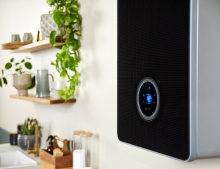How to bleed a radiator
Do your radiators need bleeding?
Over time it is normal for air to build up in your radiators which can affect their efficiency. When air builds up it will mean some areas of radiator will be colder than others. You can normal tell if your radiators need bleeding as they will be colder at the top than at the bottom. If this is the other way round (cold at the bottom and hot at the top) this could mean that sludge has built up in your radiator and you might need your system cleaned.
How to bleed a radiator
1. First of all, turn your heating on and wait for the radiators to warm up. Check all radiators and identify which radiators might need bleeding.
2. Turn off your heating system and wait for the radiators to cool
3. Insert your radiator key into the bleed screw in the bleed valve which will be at the top of your radiator. Make sure you have a cloth or rag ready to hold under the bleed valve to catch any drips.
4. Turn the radiator key anti-clockwise to open the valve. You will hear a hissing sound (this is the gas escaping). Some water might escape.
5. Keep the radiator key turned until water starts to flow steadily and then turn the radiator key clockwise to close the valve.
6. Use the cloth to catch the drips and clean up any excess water.
7. When you have bled all the affected radiators, turn the heating system back on. Check treated radiators to make sure they are now warm all over.
8. After you have finished bleeding all the radiators, make sure you top up the pressure on your boiler. Boiler pressure can be lost when bleeding radiators. If you need help topping up the boiler pressure, view our guide here.
More Home Heating FAQs
- Guarantee vs Warranty
- How do I know that my condensate pipe is blocked?
- My boiler is producing a 'gurgling' sound what could be the cause?
- What is a thermostatic radiator valve (TRV)?
- Why might I want to programme hot water times with my combi boiler?
- Do I need a boiler, solar panels or heat pumps to heat my home?
- Do you recommend treatment of the central heating water?
- How does part L of the Building Regulations affect my boiler installation?
- What do the error symbols mean on my boiler?
- Should I have my heating system treated or cleansed?




